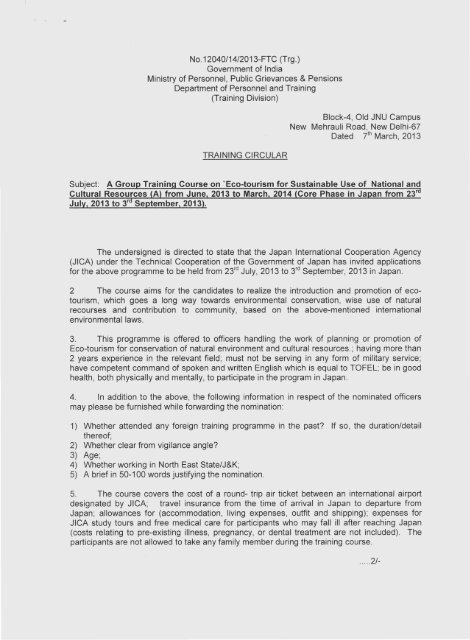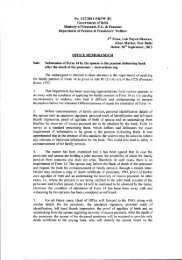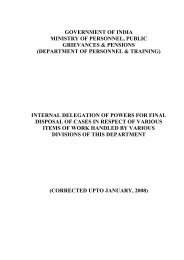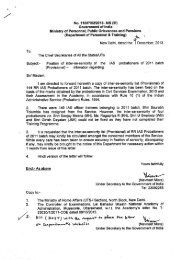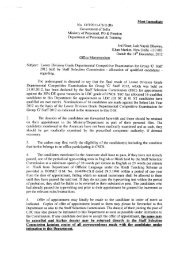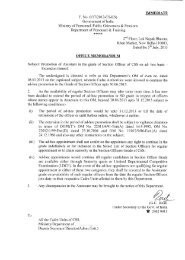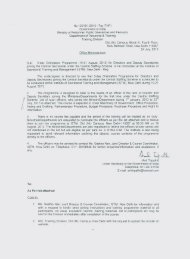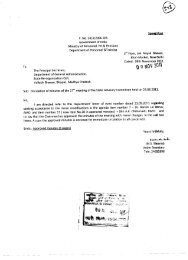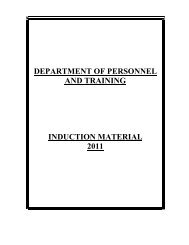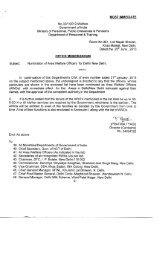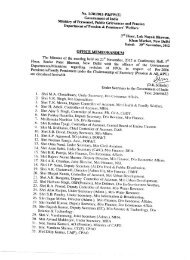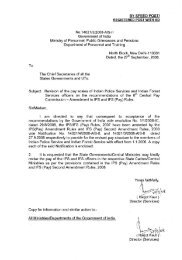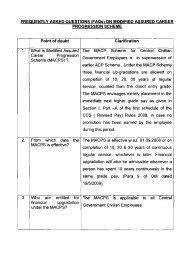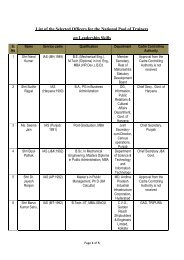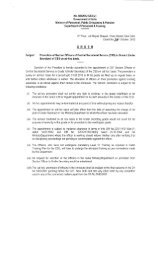A Group Training Course on Eco-tourism for Sustainable Use of ...
A Group Training Course on Eco-tourism for Sustainable Use of ...
A Group Training Course on Eco-tourism for Sustainable Use of ...
You also want an ePaper? Increase the reach of your titles
YUMPU automatically turns print PDFs into web optimized ePapers that Google loves.
•No.12040/14/2013-FTC (Trg.)Government <strong>of</strong> IndiaMinistry <strong>of</strong> Pers<strong>on</strong>nel, Public Grievances & Pensi<strong>on</strong>sDepartment <strong>of</strong> Pers<strong>on</strong>nel and <str<strong>on</strong>g>Training</str<strong>on</strong>g>(<str<strong>on</strong>g>Training</str<strong>on</strong>g> Divisi<strong>on</strong>)NewBlock-4, Old JNU CampusMehrauli Road, New Delhi-67Dated 7thMarch, 2013TRAINING CIRCULARSubject: A <str<strong>on</strong>g>Group</str<strong>on</strong>g> <str<strong>on</strong>g>Training</str<strong>on</strong>g> <str<strong>on</strong>g>Course</str<strong>on</strong>g> <strong>on</strong> "<strong>Eco</strong>-<strong>tourism</strong> <strong>for</strong> <strong>Sustainable</strong> <strong>Use</strong> <strong>of</strong> Nati<strong>on</strong>al andCultural Resources (A) from June. 2013 to March. 2014 (Core Phase in Japan from 23 rdJuly. 2013 to 3 rd September. 2013).The undersigned is directed to state that the Japan Internati<strong>on</strong>al Cooperati<strong>on</strong> Agency(JICA) under the Technical Cooperati<strong>on</strong> <strong>of</strong> the Government <strong>of</strong> Japan has invited applicati<strong>on</strong>s<strong>for</strong> the above programme to be held from 23 rd July, 2013 to 3 rd September, 2013 in Japan.2 The course aims <strong>for</strong> the candidates to realize the introducti<strong>on</strong> and promoti<strong>on</strong> <strong>of</strong> eco<strong>tourism</strong>,which goes a l<strong>on</strong>g way towards envir<strong>on</strong>mental c<strong>on</strong>servati<strong>on</strong>, wise use <strong>of</strong> naturalrecourses and c<strong>on</strong>tributi<strong>on</strong> to community, based <strong>on</strong> the above-menti<strong>on</strong>ed internati<strong>on</strong>alenvir<strong>on</strong>mental laws.3. This programme is <strong>of</strong>fered to <strong>of</strong>ficers handling the work <strong>of</strong> planning or promoti<strong>on</strong> <strong>of</strong><strong>Eco</strong>-<strong>tourism</strong> <strong>for</strong> c<strong>on</strong>servati<strong>on</strong> <strong>of</strong> natural envir<strong>on</strong>ment and cultural resources.; having more than2 years experience in the relevant field; must not be serving in any <strong>for</strong>m <strong>of</strong> military service;have competent command <strong>of</strong> spoken and written English which is equal to TaFEL; be in goodhealth, both physically and mentally, to participate in the program in Japan.4. In additi<strong>on</strong> to the above, the following in<strong>for</strong>mati<strong>on</strong> in respect <strong>of</strong> the nominated <strong>of</strong>ficersmay please be furnished while <strong>for</strong>warding the nominati<strong>on</strong>:1) Whether attended any <strong>for</strong>eign training programme in the past? If so, the durati<strong>on</strong>/detailthere<strong>of</strong>;2) Whether clear from vigilance angle?3) Age;4) Whether working in North East State/J&K;5) A brief in 50-100 words justifying the nominati<strong>on</strong>.5. The course covers the cost <strong>of</strong> a round- trip air ticket between an internati<strong>on</strong>al airportdesignated by JICA; travel insurance from the time <strong>of</strong> arrival in Japan to departure fromJapan; allowances <strong>for</strong> (accommodati<strong>on</strong>, living expenses, outfit and shipping); expenses <strong>for</strong>JICA study tours and free medical care <strong>for</strong> participants who may fall ill after reaching Japan(costs relating to pre-existing illness, pregnancy, or dental treatment are not included). Theparticipants are not allowed to take any family member during the training course ......2/-
-2-6. It is requested that the nominati<strong>on</strong> <strong>of</strong> the suitable candidates may please be <strong>for</strong>wardedto this Department in accordance with the eligibility criteria.7. The nominati<strong>on</strong> details should be submitted (in duplicate) in the JICA's prescribedpro<strong>for</strong>mas duly authenticated by the Department c<strong>on</strong>cerned al<strong>on</strong>g with the Job Report.8. The applicati<strong>on</strong>s should reach this Department through the AdministrativeMinistry/State Government not later than 13 th May, 2013. Nominati<strong>on</strong>s received after theprescribed date will not be c<strong>on</strong>sidered. The details <strong>of</strong> the programme and the applicati<strong>on</strong> <strong>for</strong>mmay be drawn from Ministry <strong>of</strong> Pers<strong>on</strong>nel, Public Grievances and Pensi<strong>on</strong>s website(persmin.nic.in), which is available in "What is New" under the Department <strong>of</strong> Pers<strong>on</strong>nel and<str<strong>on</strong>g>Training</str<strong>on</strong>g>.(N.K. Wadhwa)Under Secretary to the Government <strong>of</strong> IndiaTele.No.011-26165682E-mail-IDnaresh.wadhwa@nic.inCopy to:1. The Secretary, Ministry <strong>of</strong> Tourism, Transport Bhawan, Parliament StreetNew Delhi- 1100012. The Secretary, Ministry <strong>of</strong> Envir<strong>on</strong>ment and Forests, Paryavaran Bhavan, CGOComplex, Lodhi Road, New Delhi-1100033. All State Governments/Uni<strong>on</strong> Territories (with the request to circulate it am<strong>on</strong>gst therelated organizati<strong>on</strong>s).4. NIC with the request to post the circular al<strong>on</strong>g with the JICA's circular and the enclosedapplicati<strong>on</strong> Pro<strong>for</strong>ma <strong>on</strong> the Department's website.
~----tJ""aprroa~lirllrnlit'l'!ternati<strong>on</strong>alCooperati<strong>on</strong> Agency(Government<strong>of</strong> Japan)No. 11/GT-CP/2013 March 01, 2013Mr. N.K. WadhwaUnder Secretary (<str<strong>on</strong>g>Training</str<strong>on</strong>g>)Department<str<strong>on</strong>g>Training</str<strong>on</strong>g> Divisi<strong>on</strong>Block No.4Old JNU CampusNew MehrauliNew Delhi<strong>of</strong> Pers<strong>on</strong>nel and <str<strong>on</strong>g>Training</str<strong>on</strong>g>RoadSubject: <str<strong>on</strong>g>Group</str<strong>on</strong>g> <str<strong>on</strong>g>Training</str<strong>on</strong>g> <str<strong>on</strong>g>Course</str<strong>on</strong>g> in <strong>Eco</strong>-<strong>tourism</strong> <strong>for</strong> <strong>Sustainable</strong> use <strong>of</strong> Natural and CulturalResources(A).Dear Mr. N. K. Wadhwa,Please refer to our letter No. 11/GT-CP/2012 dated February 19, 2013, <strong>for</strong>wardingtherewith the General In<strong>for</strong>mati<strong>on</strong> Booklet <strong>on</strong> the capti<strong>on</strong>ed training course.Up<strong>on</strong> receipt <strong>of</strong> communicati<strong>on</strong> from our headquarters in Japan we would like to in<strong>for</strong>myou that the durati<strong>on</strong><strong>of</strong> the a<strong>for</strong>esaid course has been changed as follows:-Original Durati<strong>on</strong>:-Changed Durati<strong>on</strong>:-July 16, 2013 to August 27, 2013July 23, 2013 to September 03, 2013The revised General In<strong>for</strong>mati<strong>on</strong> Booklet <strong>on</strong> the course is attached herewith with arequest to kindly transmit the <strong>for</strong>egoing in<strong>for</strong>mati<strong>on</strong> to the authorities c<strong>on</strong>cerned.With regards,Yours sincerely,LtL,c' UChi-Senior Represe tativeEnd: As stated above.JICA India Office2nd Floor, Dr. Gopal Das Bhawan28, Barakhamba Road,New Delhi-11 000 1TEL: +91-11-47685500FAX: +91-11-47685555URL: http://www.jica.go.jp/
•JICATRAINING ANDDIALOGUEPROGRAMSGENERAL INFORMATION<str<strong>on</strong>g>Group</str<strong>on</strong>g> <str<strong>on</strong>g>Training</str<strong>on</strong>g> Program"<strong>Eco</strong>-Tourism <strong>for</strong> <strong>Sustainable</strong> <strong>Use</strong><strong>of</strong> Natural and Cultural Resources(A)"JFY2013NO. J1300655 1 10. 1380756Phase in Japan: from July 23 to September 3, 2013This in<strong>for</strong>mati<strong>on</strong> pertains to <strong>on</strong>e <strong>of</strong> the <str<strong>on</strong>g>Training</str<strong>on</strong>g> and Dialogue Programs <strong>of</strong> the JapanInternati<strong>on</strong>al Cooperati<strong>on</strong> Agency (JICA). which shall be implemented as part <strong>of</strong> theOfficial Development Assistance <strong>of</strong> the Government <strong>of</strong> Japan based <strong>on</strong> bilateralagreement between both the Governments or recipient country and Japan.1/16
I. C<strong>on</strong>ceptBackgroundThe United Nati<strong>on</strong>s designated the year 2002 as "the Internati<strong>on</strong>al Year <strong>of</strong> <strong>Eco</strong><strong>tourism</strong>"to encourage more people to see <strong>tourism</strong> from the viewpoint <strong>of</strong> sustainabledevelopment. <strong>Eco</strong><strong>tourism</strong> aims to help people experience and understand localnatural envir<strong>on</strong>ments and traditi<strong>on</strong>al culture, c<strong>on</strong>tributing to better c<strong>on</strong>servati<strong>on</strong> <strong>of</strong> theseassets as well as community development.The World Tourism Organizati<strong>on</strong> (WTO) defines sustainable <strong>tourism</strong> as <strong>tourism</strong> thatc<strong>on</strong>serves not <strong>on</strong>ly natural resources but also historical heritage and tangible/intangibleresources including traditi<strong>on</strong> and culture, as well as <strong>tourism</strong> in which visitors cherishprecious sightseeing resources and c<strong>on</strong>tribute to their passage to the next generati<strong>on</strong>.In many developing countries, <strong>tourism</strong> is an important industry that brings <strong>for</strong>eigncurrency, and is valued in terms <strong>of</strong> regi<strong>on</strong>al development advantages such as thecreati<strong>on</strong> <strong>of</strong> job opportunities in the relevant areas and regi<strong>on</strong>al ec<strong>on</strong>omic revitalizati<strong>on</strong>.Equal emphasis <strong>on</strong> the development and c<strong>on</strong>servati<strong>on</strong> <strong>of</strong> <strong>tourism</strong> resources is a vitalissue. At the same time, envir<strong>on</strong>mental c<strong>on</strong>servati<strong>on</strong> is a highly important and urgentissue in ec<strong>on</strong>omic and social development.Motivati<strong>on</strong>This program aims to realize the introducti<strong>on</strong> and promoti<strong>on</strong> <strong>of</strong> eco-<strong>tourism</strong>, which goesa log way toward envir<strong>on</strong>mental c<strong>on</strong>servati<strong>on</strong>, wise use <strong>of</strong> natural resources andc<strong>on</strong>tributi<strong>on</strong> to community, based <strong>on</strong> the above-menti<strong>on</strong>ed internati<strong>on</strong>al envir<strong>on</strong>mentallaws.MethodologyParticipants shall have opportunity in Japan to:1) visit nati<strong>on</strong>al parks, Ramsar sites and historical places,2) practice some field activities such as hiking, canoeing and horseback riding, and3) have discussi<strong>on</strong>s with the program leader or lectures to achieve program objective.II. Descripti<strong>on</strong>1. Title (J-No) <str<strong>on</strong>g>Group</str<strong>on</strong>g> <str<strong>on</strong>g>Training</str<strong>on</strong>g> Program <strong>on</strong> "<strong>Eco</strong>-<strong>tourism</strong> <strong>for</strong> <strong>Sustainable</strong> <strong>Use</strong> <strong>of</strong>Natural and Cultural Resources (A)" (J-1300655)2. Period <strong>of</strong> Program:Durati<strong>on</strong> <strong>of</strong> whole program:Preliminary Phase:(in a participant's home country)Core Phase in Japan:Finalizati<strong>on</strong> Phase:(in a participant's home country)June, 2013 to March, 2014June, 2013 to July, 2013July 23 to September 3, 2013September 2013 to March, 20142/16
3. Target Countries:Cambodia (1), Viet Nam (1), Nepal (1), T<strong>on</strong>ga (1), Palau (1), Zimbabwe (1), India (1)Sri Lanka (1), Senegal (1)4. Eligible I Target Organizati<strong>on</strong>s:Nati<strong>on</strong>al/local government organizati<strong>on</strong>s and NGOs involved in <strong>tourism</strong> promoti<strong>on</strong> oref<strong>for</strong>ts to c<strong>on</strong>serve the natural envir<strong>on</strong>ment and cultural resources5. Total Number <strong>of</strong> Participants: 8 participants6. Working Language: English7. Program Objective:Draft plans to introduce and disseminate eco<strong>tourism</strong> as a tool <strong>for</strong> sustainable regi<strong>on</strong>aldevelopment involving local residents <strong>for</strong> areas, where the introducti<strong>on</strong> <strong>of</strong> eco<strong>tourism</strong> isexpected, are <strong>for</strong>mulated by the target organizati<strong>on</strong>s.8. Overall Goal:The plan to establish an organizati<strong>on</strong> and a network that include local residents will bedrafted <strong>for</strong> the introducti<strong>on</strong> and operati<strong>on</strong> <strong>of</strong> eco<strong>tourism</strong>, and the plan to disseminateeco<strong>tourism</strong><strong>for</strong> both tour providers and users will be implemented.9. Expected Module Output and C<strong>on</strong>tents:This program c<strong>on</strong>sists <strong>of</strong> the following comp<strong>on</strong>ents:(1) Preliminary Phase in a participant's home country (June, 2013 to July, 2013)Participating organizati<strong>on</strong>s make required preparati<strong>on</strong> <strong>for</strong> the Program in the respectivecountry.Expected Module Output ActivitiesFormulati<strong>on</strong> and submissi<strong>on</strong> <strong>of</strong> Incepti<strong>on</strong> ReportIncepti<strong>on</strong> Report is Formulated. to the respective country's JICA Offices together(Please refer to Annex, Attachment-1) .(2) Core Phase in Japan (July 23 to September 3, 2013)Participants dispatched by the organizati<strong>on</strong>s attend the Program implemented in Japan.Expected Module Output 1: Participants will be able to understand and explainphilosophy and measures related to eco<strong>tourism</strong> in the c<strong>on</strong>text <strong>of</strong> sustainable use <strong>of</strong> naturaland cultural resources.Topics Methodology DetailsRegi<strong>on</strong>al ef<strong>for</strong>ts <strong>for</strong> Lecture/ Learn about optimal eco<strong>tourism</strong> based <strong>on</strong> theeco<strong>tourism</strong> ideals/guidelines <strong>of</strong> the Ramsar C<strong>on</strong>venti<strong>on</strong>(in relati<strong>on</strong> to the through an eco-tour in the Kushiro area as anexample <strong>of</strong> wise usage in wetlands under theRamsar C<strong>on</strong>venti<strong>on</strong>)c<strong>on</strong>venti<strong>on</strong>3/16
7Installati<strong>on</strong> and use <strong>of</strong> Observati<strong>on</strong> Learn about c<strong>on</strong>siderati<strong>on</strong> <strong>for</strong> vegetati<strong>on</strong> whenfacilities in nati<strong>on</strong>al park installing walking trails, their layout <strong>for</strong>(walking trails) highlighting the diversified natural envir<strong>on</strong>mentand their use <strong>for</strong> eco<strong>tourism</strong> and envir<strong>on</strong>mentaleducati<strong>on</strong> from the example <strong>of</strong> a walking trailinstalled in a hilly area facing the Kushirowetland<strong>Use</strong> <strong>of</strong> facilities in Observati<strong>on</strong> Learn about exhibiti<strong>on</strong> techniques andnati<strong>on</strong>al parks promoti<strong>on</strong>al activities including educati<strong>on</strong>alprograms <strong>for</strong> envir<strong>on</strong>mental c<strong>on</strong>servati<strong>on</strong> fromexamples <strong>of</strong> nature in<strong>for</strong>mati<strong>on</strong> facilities innati<strong>on</strong>al parksWetland c<strong>on</strong>servati<strong>on</strong> Practice Learn about the significance and methods <strong>of</strong>and eco-tours m<strong>on</strong>itoring in natural parks/reserves fromexamples <strong>of</strong> wetland m<strong>on</strong>itoring in the KushiroWetland natural m<strong>on</strong>ument areaManagement/operati<strong>on</strong> Lecture Learn about policies required <strong>for</strong> the<strong>of</strong> nati<strong>on</strong>al parks in c<strong>on</strong>servati<strong>on</strong> and use <strong>of</strong> the naturalJapan envir<strong>on</strong>ment from examples highlighting theoperati<strong>on</strong> <strong>of</strong> nati<strong>on</strong>al parks in JapanJapan's policies <strong>on</strong> Lecture Learn about the Japanese Government'seco<strong>tourism</strong> eco<strong>tourism</strong> promoti<strong>on</strong> policies from related lawsand promoti<strong>on</strong>alprojects in JapanCultural/historical sites Lecture/ Learn about eco-tours related to theand eco-tour programs observati<strong>on</strong> c<strong>on</strong>servati<strong>on</strong> <strong>of</strong> cultural resources throughexamples from KyotoOverview <strong>of</strong> eco<strong>tourism</strong> Lecture Learn about the ideals and basics <strong>of</strong> eco<strong>tourism</strong>through examples from around the worldExpected Module Output 2: Participants will be able to discuss plans to promoteeco<strong>tourism</strong> in c<strong>on</strong>siderati<strong>on</strong> <strong>of</strong> envir<strong>on</strong>mental c<strong>on</strong>servati<strong>on</strong>.Natural park eco-tour Practice Learn about eco-tour programs using regi<strong>on</strong>alprograms nature in an eco-friendly manner from examples(trekking and other <strong>of</strong> trekking and some other activities in <strong>for</strong>est.outdoor activities)Natural park eco-tour Practice Learn about how local products can be adoptedprograms( cooking) <strong>for</strong> <strong>tourism</strong> through a program to use locallyproduced crops <strong>for</strong> outdoor cooking, etc.Natural park eco-tour Practice Learn about how regi<strong>on</strong>al natural characteristicsprograms can be leveraged <strong>for</strong> envir<strong>on</strong>mental educati<strong>on</strong>(educati<strong>on</strong>al programs) tour programs that any<strong>on</strong>e can experience,including nature watching and crafting, etc.Field-based eco-tour Practice Learn about finding regi<strong>on</strong>al resources, materialsprograms <strong>for</strong> tours and envir<strong>on</strong>mental educati<strong>on</strong>, and the(in the Kushiro specific use <strong>of</strong> such resources through anWetland) eco-tour program that introduces prehistoricremains and springs in the Kushiro Wetland4/16


